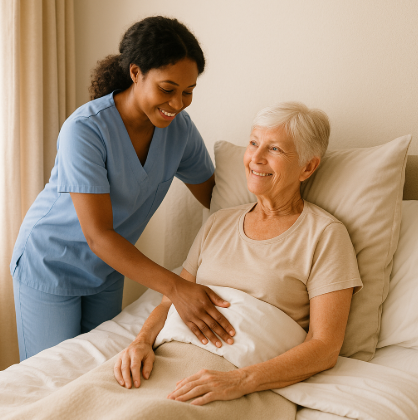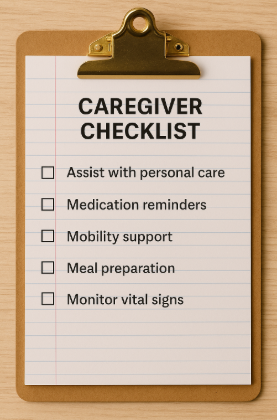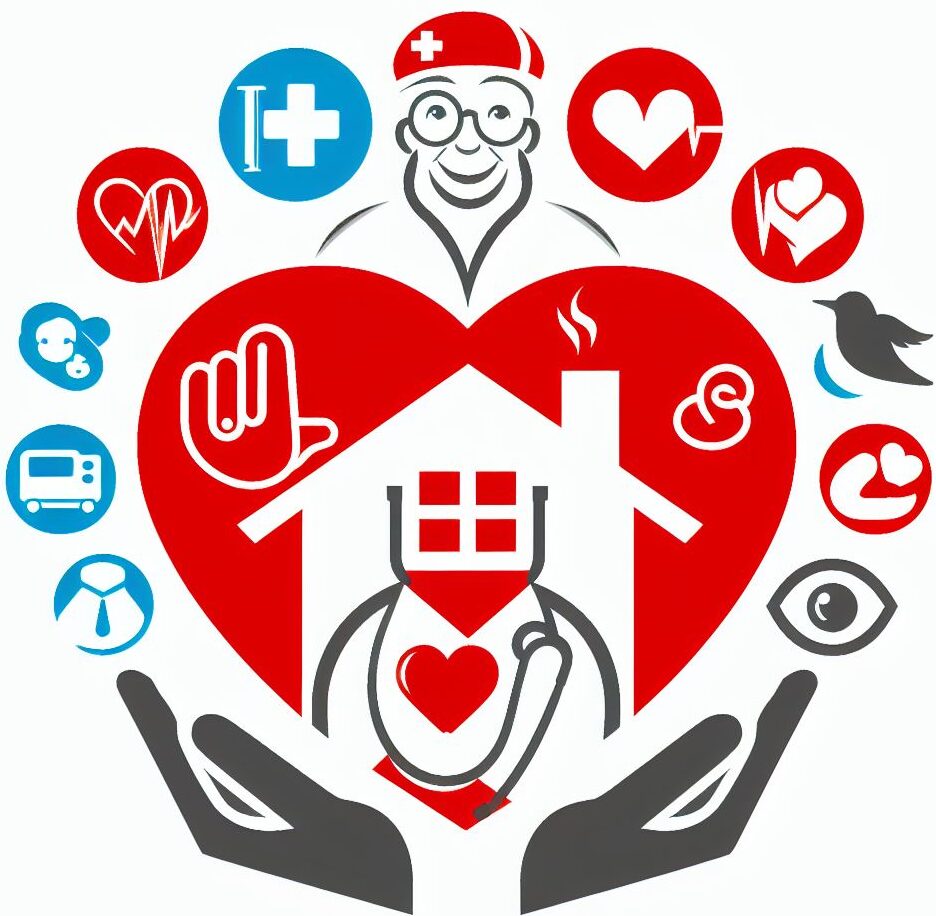This Clinical Skills Series is designed to support you, the caregiver and family members, with clear, practical instruction grounded in real-life experience.
It’s about empowering you to provide safe, dignified, and confident care—especially within the unique, intimate setting of someone’s home.

Empowering Everyday Heroes with Practical, Hands-On Guidance
Caring for another human being is one of the most profound responsibilities a person can take on. It calls for empathy, patience, resilience, and above all—skill.
Whether you’re a trained professional or a family member suddenly thrown into the role, caregiving is both a calling and a challenge. And it’s one that doesn’t come with all the answers up front.
A Brief History of Caregiving
Caregiving is as old as humanity itself. For centuries, families cared for loved ones through illness and aging using knowledge passed down from generation to generation.
Long before formal healthcare systems were established, it was the responsibility of communities and kin to tend to the weak and wounded.
In the 19th century, figures like Florence Nightingale revolutionized nursing and laid the groundwork for what we now consider clinical standards. They emphasized cleanliness, observation, and compassionate care.
Over time, caregiving evolved alongside medical science. Moreover, the heart of it remained the same: people caring for people.
Today, caregiving continues to grow in importance. Furthermore, consider the rise in chronic illnesses, longer lifespans, and the growing desire for aging in place. As a result, there is an increased demand for skilled, compassionate caregivers in home settings.
Who Are Caregivers Today?
Caregivers come in many forms:
- Family caregivers, often unpaid, who step up out of love and necessity
- Certified Nursing Assistants (CNAs) and Home Health Aides (HHAs) working with agencies or private families
- Respite caregivers who step in temporarily to give the primary caregiver a break
- Live-in caregivers offering round-the-clock support
- Weekend, day, night, and overnight aides, each adapting to meet the needs of the household
Regardless of the shift or job title, all caregivers share a common thread: a willingness to serve others with care, compassion, and skill.

What Are Clinical Skills, and Why They Matter?
In a hospital or facility, clinical skills are expected. But in a home environment, they’re often overlooked—even though the same risks and responsibilities exist. Clinical skills include everything from:
- Safely giving a bed bath or brushing someone’s teeth
- Monitoring vital signs and noticing changes in condition
- Transferring someone without causing injury
- Preventing infections through proper hygiene
- Supporting emotional well-being through communication
These skills aren’t just technical—they’re life-enhancing. When applied correctly, they reduce complications, prevent burnout, and improve the quality of life for both the caregiver and the person receiving care.
Bridging the Gap Between Training and Real Life
Many caregivers are trained in classroom settings or through online courses. However, real-life caregiving often looks very different. A perfect technique in a training manual may not work when someone’s confused, frightened, or in pain.
That’s where this Clinical Skills Series comes in.
It focuses on the everyday realities of home caregiving—not just what’s ideal, but what’s practical. Each skill is broken down with:
- Step-by-step instructions
- Real-world tips and adjustments
- Equipment recommendations for home use
- Printable checklists or tip sheets (when possible)
This series goes beyond passing an exam. More importantly, it’s about showing up confidently in the moments that matter.
Importance of Communication and Emotional Support
One of the most vital caregiving skills can’t be taught with a stethoscope or a pair of gloves: how to connect. A gentle tone, a reassuring touch, or simply listening can turn fear into peace and frustration into understanding.
This series will also touch on:
- How to support clients with dementia or memory loss
- Ways to build trust when a person feels vulnerable
- Recognizing the emotional and spiritual needs of those receiving care
Whether you’re bathing someone or helping them get dressed, every interaction is an opportunity to affirm their dignity and worth.
What’s Ahead in the Series
Here’s a preview of the core areas we’ll cover:
- Personal Care: Full and partial bed baths, perineal care, mouth and denture care
- Mobility & Transfers: Using gait belts, walkers, transfer boards, and safe body mechanics
- Feeding & Nutrition: Meal assistance, dysphagia tips, and hydration awareness
- Toileting & Incontinence Care: Bedpans, urinals, pads, and skin protection
- Infection Control & Vital Signs: Hand hygiene, temperature, pulse, respiration, blood pressure
- Emotional Support & Communication: Dementia care, end-of-life care, building trust
Each article will be practical, focused, and rooted in the belief that you can deliver care that’s both safe and compassionate.

A Special Word to Family Caregivers
You may not wear scrubs, but you’re doing the work—and you’re not alone.
Many family members become caregivers without warning, often balancing jobs, children, and their own health. It’s overwhelming, and sometimes isolating. But with the right knowledge and support, you can feel more prepared and less burdened.
You deserve to feel capable. You deserve to be supported. And you deserve to know what to do—step by step.
This series is here to help you with that. Remember:
You’re doing sacred work—even when no one sees.
You’re learning. You’re growing. And you’re not in this alone.
Let this series be your guide, your encouragement, and your toolkit.
Together, we’ll take it one skill at a time.
Conclusion | Clinical Skills for Caregivers
No one begins their caregiving journey with all the answers. However, with the right support, guidance, and a willingness to learn, you can grow into your role with skill and confidence.
This series is here to walk with you, one practical step at a time, as you care for others with both competence and compassion.
Whether you’re assisting a loved one at home or providing professional care, the foundation of great caregiving lies in mastering the basics. Each skill you develop becomes another way to:
- Preserve dignity
- Promote safety
- And bring comfort to those who depend on you.
So take a deep breath, give yourself grace, and know that you’re not alone. You’ve taken the first step by showing up—and that matters more than you know.
Let’s begin this journey together.
Next up: Hand Hygiene – The First Line of Defense
The foundation of safe care starts with something as simple—and powerful—as washing your hands.
We’d Love to Hear from You!
Have a question about caregiving? Want to share your own experience or insight?
Drop your comments or questions below—your voice could be the encouragement someone else needs. Let’s learn and grow together as we build confidence in the everyday essentials of care.
Veron | Entrepreneur | The Way 4Word Enterprises
